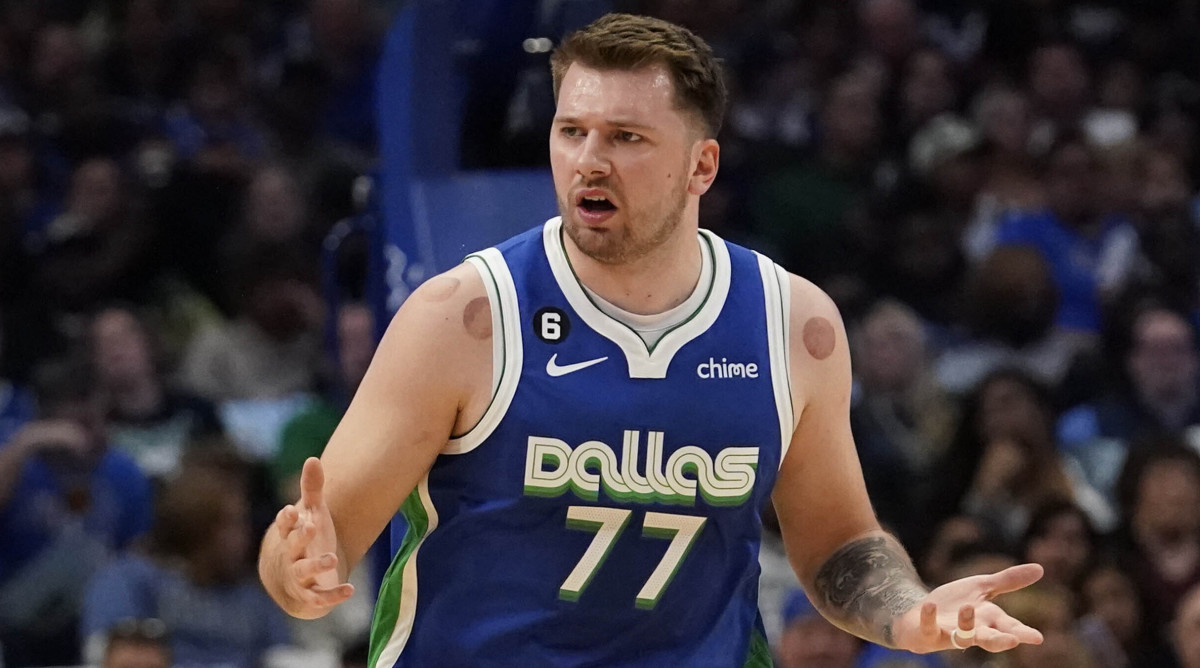The Rules Are Different for Certain NBA Players at This Time of Year

There are three things in life we’ve all more or less come to expect: death, taxes and late-season NBA penalties that don’t get enforced because of the time of year we’re in.
Just in case you hadn’t noticed: With the addition of the play-in round, NBA standings are essentially tighter than they’ve ever been. There’s a week and a half remaining in the regular season, and only four teams have been eliminated from postseason contention, the fewest in league history with so little time left on the calendar. Most games are taking on added importance now—for seeding, or for mere inclusion in the postseason at all—so everything is under a harsh microscope. That includes players’ technical-foul totals, which trigger a one-game suspension once someone accumulates 16 of them, and an additional suspension for every two after that.
Two players in particular, All-NBA guard Luka Dončić of the Mavericks and four-time All-Star Draymond Green of the Warriors, have come up in recent days due to their flirtations with suspensions. With their teams locked in tight playoff races, Dončić drew a 16th technical Sunday in the midst of a game with the Hornets (one that would ultimately become Dallas’s fourth straight loss) and Draymond Green got a 17th tech Tuesday before daring officials to hand him another the very next play when he appeared to step on Pelicans wing Herbert Jones and possibly kick his leg toward him while standing up following a collision between the men.
Announcers calling both games immediately knew what the stakes were.
“That technical is very unfortunate because …” Mavs analyst Derek Harper started.
“Because he will be suspended for tomorrow night’s game against the Indiana Pacers,” play-by-play man Mark Followill finished.
“Draymond Green’s gotta be careful. He’s in that situation now where every other technical gives him a game suspension,” TNT analyst Stan Van Gundy said Tuesday night as Green shouted repeatedly at official Ed Malloy after making the initial call. “And these games, every one of ‘em is gonna be crucial. You don’t wanna be on the outside looking in.”

But ultimately, both stars were spared. The NBA rescinded Dončić’s tech a day later, allowing him to play against Indiana. (He had 25 points, seven boards and six assists, and the Mavs broke their skid.) And Green somehow avoided getting a second technical Tuesday, despite multiple instances where a second call could have been made to toss him from the contest.
Pacers coach Rick Carlisle chimed in, suggesting that the competitor in him didn’t want to see Dončić forced to sit out against his club, even if the star’s antics had been deserving of a tech. “I didn’t really get a very close study on what happened,” said Carlisle, who coached Dončić to begin his NBA career. “But at that point, unless it’s something really over the top, with what everybody is competing for, you can’t have a guy lose a game.”
Put another way: The league, which undoubtedly has a monetary interest in keeping certain teams alive as long as they can, will often find ways to keep key star talent eligible by giving those players more slack, even if they’ve crossed a line they clearly weren’t supposed to.
The dilemma is one die-hard NBA fans often feel differently about, much like the question of whether refs should make borderline calls at the end of close games. Some feel they should be handled differently, and not called, so as to not decide the outcome. Others like the idea of calling the last two minutes the same way the first 46 minutes were officiated. To be fair, the league does go back and occasionally rescind technicals at earlier points in the season, too. (Nonetheless, Green posted a tweet Monday laughing at Dončić’s penalty being rescinded.)
With Green, specifically, it goes without saying that the league has shown a willingness to come down on him before in a moment with all the marbles on the line. They suspended him for a game during the tail end of the 2016 NBA Finals—a series Golden State at one point led 3–1 over LeBron James and the Cavs—after Green took a relatively obvious swipe at James’s groin. The impact of the suspension was enormous, as Cleveland won Game 5 without Green, then won Game 6 and Game 7 to become the first NBA team to rally from 3–1 down to win a title.
Still, there’s something to be said for how much of an advantage it becomes for Green when he’s emboldened by knowing that referees are forced to think twice before T’ing him up. In Game 2 of last year’s NBA Finals, for instance, when Green already had a technical in the contest, he got tangled up with Boston’s Jaylen Brown before leaving his feet on top of Brown’s back. After Brown reacted to shake himself free, Green then pushed Brown in the back.
“In the normal course of a game, this would be a double T [and an ejection for Green],” analyst Jeff Van Gundy said matter of factly as the replay of the run-in was shown.
And that’s just it: The rules—and even the penalties that referees call on the floor—tend to shift when there’s more at stake for certain teams. Whether that should be the case is up for debate. But the fact that it clearly happens every year, particularly with Green, is no longer debatable.
